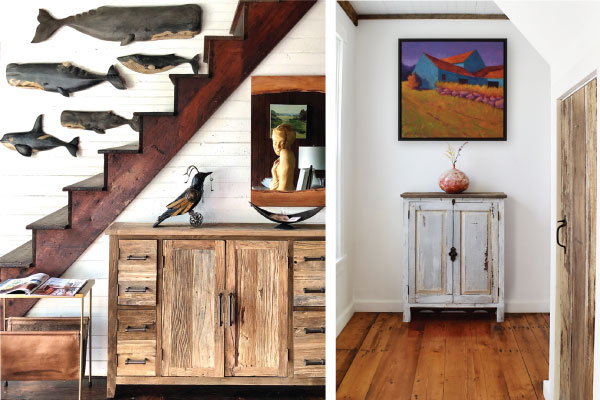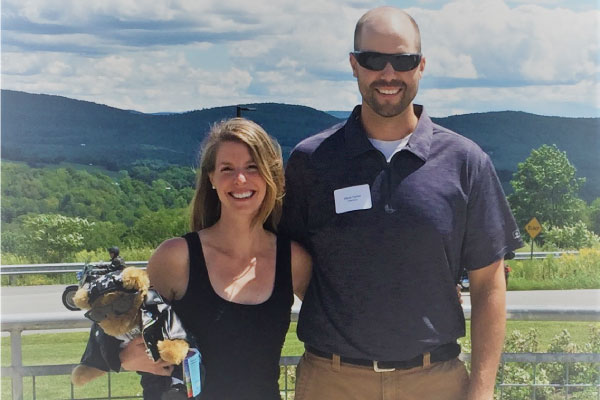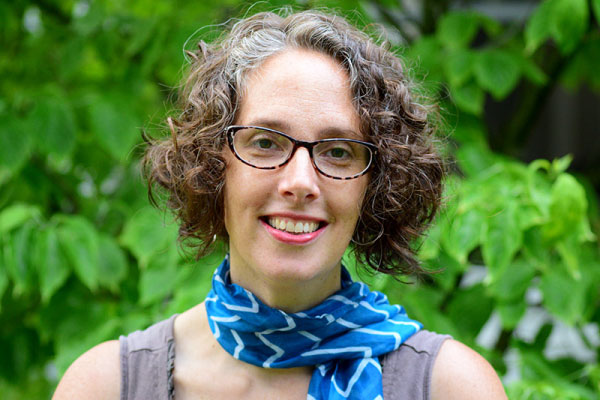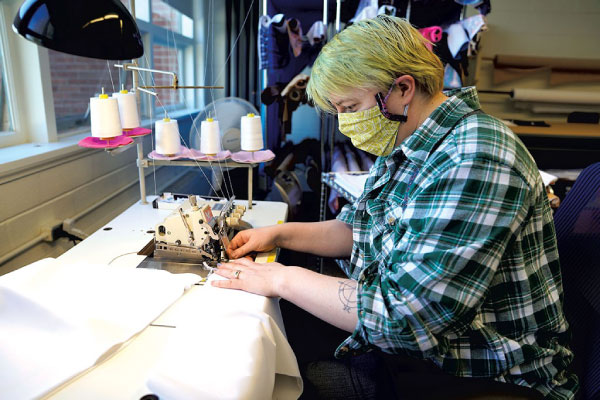
by Kelsey Price | Mar 4, 2022 | Outdoor Recreation, Tourism & Hospitality
Vermont’s outdoor guides help visitors take their first steps into new outdoor activities, show them some of the state’s most beautiful places, and provide a welcoming, safe environment for exploration.
Following in and establishing an outdoor guide business requires a strong foundation of outdoor experience, bolstered with professional licensure and relationships with other outdoor recreation businesses, says Graydon Stevens, executive director of Vermont Outdoor Guide Association.
Success as a guide starts with a genuine love for the outdoors, says Travis Dezotell, who owns Island Pond-based Gibbs Guides.
“There’s no replacement for the experience side of it.” Guides spend as much effort managing the excursion, including ensuring safe use of gear and making quick decisions based on the weather, as they do entertaining their clients.
“You have to constantly be on the lookout. You can’t fake it,” Dezotell said.
Capt. Matthew Trombley, owner of 3rd Alarm Charters, a fishing guiding service based in Rutland County and serving the Killington and Okemo areas, grew up spending almost all his time outdoors and agrees – experience and passion for the outdoors is a must, because it makes inspiring others easy.
Trombley pursued professional licensure and is now a Masters Captain. His company owns and operates three boats, and he is president of the board of Vermont Outdoor Guide Association.
Career paths centered around recreation provide solid footing for a guiding business, Stevens says.
Dezotell started his outdoor guide career as director of a parks and recreation department in Vermont. In his spare time, he wrote and published a guidebook about hiking and snowshoeing, and things took off from there.
“All of a sudden, I started getting more phone calls from people asking to go on hikes and other experiences like that. More than I was selling books, people really wanted to go on hikes.” Quimby Country, an outdoor retreat in the Northeast Kingdom, saw Dezotell’s blog posts and hired him to be the outdoor recreation specialist.
“My business springboarded off of that start in the industry,” he said.
Dezotell still works with clients at Quimby Country, an outdoor retreat in Vermont’s Northeast Kingdom, but has since gone on to own and manage Gibbs Guides full-time.
He says besides building a solid base of outdoor experience, creativity and a willingness to go off the beaten path – both literally and metaphorically as guides establish their businesses – are key.
Vermont’s business landscape, he says, provides opportunities for people to make a living if they’re willing to work hard and look for unexpected opportunities.
Social media can be a cost-effective way to scale an outdoor guide business. Blogging, sharing outdoor tips, and posting high-quality images inspires people and helps build a client base.
Stevens says Vermont’s geographic diversity means there’s many different opportunities for guides to find footholds in the state’s business community.
Vermont’s guides offer such diverse experiences as fishing, snowshoeing, hiking, camping, canoeing, ice climbing, SCUBA diving, sky diving, and dog sledding.
“Guide services operate year-round, matching our four seasons,” said Stevens.
Spring in Vermont makes for excellent fishing, road bike touring, and nature tours. In early summer, hiking, rock climbing, mountain biking, horseback riding and ATV tours are all great options into fall, when many people visit to take in Vermont’s colorful foliage. In winter, dog sledding, ice fishing, ice climbing, snowmobiling, snowshoeing, back country skiing, and more opportunities await.
Many guides partner with local lodging properties and outdoor equipment suppliers to provide a more in-depth experience for their clients and to help build their businesses, he said.
Stevens’ biggest tips for those looking to establish a guiding business in Vermont include looking for professional certifications and licensure, as well as getting a foot in the door in the industry.
“Get a job with a guide service or outfitter to start out,” he said. “Getting the appropriate certifications for your activity is important and will help you to land a job. Running a guide service involves much more than just being skilled in one or more activities. You will need to understand risk management, rules regarding commercial access to public and private lands and waterways, knowledge of State laws, customer service, marketing and more.”

by Kelsey Price | Apr 23, 2021 | VtSBDC
By Amanda Kuhnert
“Covid-19 made us re-evaluate what was important to us and what we really wanted to be doing,” said Jessie Alon, co-owner of DaVallia Gallery & Boutique in Chester, Vt. Before the pandemic, Jessie and her husband Michael were operating two business locations—an art gallery in Chester’s historic stone village and a boutique on the village green. They had often considered merging the two businesses, but the timing never felt right.
After the mandatory state shutdown last spring, due to Covid-19, Jessie and Michael shifted their focus from day-to-day operations to boosting online sales. “We responded with swift marketing to our loyal clientele,” Jessie said. They sent out e-newsletters, made phone calls, and set up free shipping for their online store. All of the hard work paid off. Online sales quickly grew to match the pre-Covid-19 revenue from the boutique, enabling the couple to close the boutique and consolidate both businesses into one location.
Along with a selection of gifts and jewelry, the “new” space sells everything you could possibly need to furnish a home, from paintings and sculptures by over a dozen New England artists to handcrafted accessories. The store’s collection includes Michael’s custom furniture made with reclaimed wood and Jessie’s line of artisan jewelry. “As artists and designers, we carefully select and curate works that are displayed in lifestyle settings,” Jessie said. “We are able to help clients select and envision pieces in their homes. Helping others live artfully is what we are passionate about, and we share that passion and knowledge with others.”
Like many parts of Vermont, the Chester area has seen an uptick in real-estate sales since the onset of the pandemic. Jessie and Michael have enjoyed helping these new homeowners turn recently purchased properties into homes, whether through a home makeover or by simply adding a few personal touches. Longtime homeowners also have helped boost sales at the gallery and boutique. Now that people are spending more time at home due to Covid-19, they have a renewed interest in improving the look and feel of their interior spaces.
Navigating the bumps in the road
Jessie and Michael embarked on their business adventure soon after the 2008 recession, in a struggling economy. Neither of them had previous business experience—Michael had recently left a job in automotive photography after discovering a passion for woodworking, and Jessie was transitioning from teaching art to becoming an independent artist. They had a shared vision and passion for curating beautiful spaces, but they needed advice and guidance to build a business that would succeed.
Soon after opening the gallery, Jessie and Michael began meeting with Debra Boudrieau, a business advisor with the Vermont Small Business Development Center (VtSBDC). Boudrieau works with entrepreneurs in Windham and Windsor counties at all stages of business development, from startups to existing businesses with room for growth. “Debra has been our adviser at the VtSBDC for 10 years now,” Jessie said. “Her knowledge and expertise has helped our business grow.”
Like most VtSBDC advisors, Debra is in it for the long haul. She guides her clients through whatever initially brought them to the VtSBDC, but then continues to be a resource as future challenges and questions arise. The Covid-19 crisis is a timely example of this ongoing partnership between Vermont business owners and the VtSBDC.
“Debra and the team at VtSBDC have worked so hard helping small businesses like us navigate through Covid-19,” Jessie said. “With so much new information coming in daily, Debra has kept us on track to what we need to know and what tools are available for our business.”
Looking for more? Visit VtSBDC.org to explore resources or connect with an advisor.

by Kelsey Price | Apr 23, 2021 | Environment, VtSBDC
It’s tempting to rest on your laurels, especially when you’ve been in business for over 35 years. But complacency isn’t what enabled Jim Parker, founder of Warren-based Clear Water Filtration, to grow a successful business. Today, Jim’s children, Jen Fleckenstein and Steve Parker, continue his legacy of innovation and problem-solving.
Jim stumbled into the water filtration business in 1970 when he discovered high levels of lead in the water on his Warren property. Unable to find a local company to help, he installed a backwashing filter himself. Pretty soon he was busy putting in filters for the entire neighborhood. This laid the groundwork for the founding of Clear Water Filtration 10 years later.
Over the next three decades the business continued to grow and expand. Today Clear Water Filtration provides environmentally friendly, high-quality water treatment devices and systems to 6,500 customers throughout Vermont.
Jim’s children, Jen Fleckenstein and Steve Parker, took over the company in 2015. Like their father, they have an eye for expansion. This year, when they had a new idea for their business, they knew they needed outside advice and guidance. So they reached out to an advisor at the Vermont Small Business Development Center (VtSBDC).
Their VtSBDC advisor, Charley Ininger, helped them flesh out their business idea and step through the process of bringing their new product to market. “Connecting with VtSBDC and, more specifically, working with Charley, has been the best strategy we ever implemented for our business,” the owners said. “He is a knowledgeable advisor, and trusted friend of Clear Water Filtration.”
The co-owners said that Charley helped them understand the importance of beta testing new products and ideas in order to create an MVP, or Most Valuable Product. This business concept is about maximizing the value of your product by focusing on what you do exceptionally well and letting go of features that don’t reach your company’s quality standards. You only release a product when it’s fully functional and able to effectively solve a problem for your customers.
What else did Jen and Steve learn from Charley? To “know your numbers!, “they said, “And how to work best with different lenders.” When asked to come up with three words to describe working with Charley, they said, “knowledge, experienced, and honest.”
Along with their unique history, the owners credit the company’s ongoing success to “our people and our unique understanding of commercial water treatment application, especially brewing.” Clear Water Filtration provides residential and commercial services statewide, from breweries and distilleries to schools and tech companies. For more info: www.clearwaterfiltration.com.
Looking for more? Visit VtSBDC.org to explore resources or connect with an advisor.

by Kelsey Price | Apr 23, 2021 | Creative Economy, Healthcare
By Amanda Kuhnert
Last summer Michelle Wiegers, a life coach based in Bennington, Vt., offered 30 hours of free coaching to 20 people suffering with chronic pain. “When COVID hit, I really wanted to reach people that are in pain because I know increased stress increases body pain,” she said.
The free 90-minute Zoom sessions, which she called the People First Project, took place over the course of 60 days. Although she said the project was “a ton of work,” she enjoyed seeing her clients discover a new path to healing. And if a few decide to sign up for a coaching package, all the better.
Individual coaching has been part of Wiegers’ business plan since starting her business in September 2019. But it wasn’t where she was directing all of her energy. In March of this year, she was planning to start offering creative workshops in her office space, which she calls “Creating Space,” located in the Benmont Mill Building in Bennington.“When COVID shut down my workshops, it forced me to narrow my focus to the coaching side of my business,” she said. “I hadn’t really done any marketing to reach new clients.”
The People First Project was an opportunity to build her business, while helping people during a difficult time. Wiegers used a body mind science approach to heal her own chronic pain, and now applies that knowledge and experience when working with clients who are struggling with similar issues.
To spread the word about the program, Wiegers posted videos on both her personal and business Facebook pages and sent emails to contacts she thought might be interested. She also reached out to a few people through Curable, an app for chronic pain sufferers.
Wiegers said the pandemic gave her the incentive to narrow her focus and “do something big like the People First Project.” But she said the health crisis also has made people more aware of their needs and willing to ask for help.
Creating a company vision
In 2019, when Wiegers first met with Nancy Shuttleworth, a business advisor with the Vermont Small Business Development Center (VtSBDC), she planned to open a retreat center. “My vision was big…I was in a dream space,” Wiegers said. “Nancy asked all the questions I didn’t know I needed to hear.” Together, they were able to zero in on Wiegers’ niche and create a company vision.
“We met periodically as she helped me refine my business plan and financial goals,” Wiegers said. “She held me accountable to take the steps I really wanted to take, as well as advised me on how to move forward.”
On the other side of the Covid-19 crisis, Wiegers plans to reignite Creating Space, a venue where people can use creative expression to expand their lives and heal. Along with offering her own workshops on chronic pain and creative writing, she looks forward to collaborating with local artists who want to use the space to teach their own creative-oriented workshops.
Wiegers is currently making plans to launch a Zoom-based mind body group for local chronic-pain sufferers. She hopes “this group will help participants begin to reverse their own chronic pain symptoms.”
Visit michellewiegers.com
Looking for more? Visit VtSBDC.org to explore resources or connect with an advisor.

by Kelsey Price | Mar 24, 2021 | Creative Economy, Diversity, Entrepreneurship, Manufacturing, Meet Your Neighbors, Southeastern Vermont
Typically, beginners learning to sew are warned to be careful when choosing fabrics. Anything stretchy, slippery or finicky requires special equipment and know-how. Stick to cotton, linen or chambray, the advice goes. Beginner patterns are often simple and loose, with room for error.
This approach wasn’t going to work for Eli and Krista Coughlin-Galbraith, who began sewing in their New York City apartment about a decade ago. They were making costumes for comic-book conventions; they wanted to use spandex and make corsets.
“We wanted to be superheroes,” Eli said. “Superheroes don’t wear flowy cotton.”
So the couple jumped straight into the deep end, sewing with difficult fabrics and trying on the clothing repeatedly to ensure a perfect fit. They made costumes for themselves and took commissions from friends, and Eli took a summer pattern-making intensive at the Fashion Institute of Technology in Manhattan.
At the same time, “a set of gender identity revelations” was inspiring Eli to try out chest binders: compression garments designed to flatten the chest. Binders are often made of thick spandex and nylon.
“I bought a chest binder for myself that did not fit. I bought a second one that did not fit,” Eli said. “And then I looked at those and went, ‘This fabric is not scary to me. The pattern is not difficult … I understand this fabric, and I can make it better.'”
In 2014, Eli and Krista founded Shapeshifters, making and selling custom binders in lively patterns and colors. Theirs was the first company to sew binders to the wearer’s specific proportions and offer sizes larger than an XL. Today, the company is based in Brattleboro and has sold thousands of binders.
“When we officially opened in 2014, we were in that transgender tipping point. Trans people were starting to hit the mainstream,” Eli said. “Before us, the binders available were awful-looking medical devices in white, black and ugly beige. And we showed up and went, ‘You can have color. You can have something that fits, something that makes you feel good.'”
Binders are most commonly associated with the trans and nonbinary communities, but the Shapeshifters website lists many reasons a person might wear one: to mitigate “gender dysphoria, to ‘pass’ as a man in day-to-day life, [for] breast reduction and back pain relief, for dancing, for archery, for other sports, because traditional bras are uncomfortable, for sensory reasons, [for] post-surgical recovery, [for] costuming, or simply for the look.”
It’s important, said Eli and Krista, to find a binder that fits. If it’s too large, it won’t flatten effectively, but if it’s too small, a binder can interfere with lung function, cause shoulder problems and even deform the chest over time.
“There was, at one point, a very long conversation — for years — happening about broken ribs and bruised ribs,” Krista said.
But a binder isn’t supposed to hurt, and with a custom fit, Shapeshifters can make a garment that does its job without causing pain or injury.
Binder fit is determined by two measurements: one around the rib cage and one around the widest point of the chest. Shapeshifters also offers customization on the neckline, length and strap width. If a binder doesn’t fit, the company will take it back to resize.
Based on years of data from selling and refitting binders, Eli developed a finely graded sizing system.
“Imagine if bras [only] came in small, medium and large, and you have an idea of what the binder market was like before we showed up,” Eli said. Since then, the world of binders has expanded a lot, and companies offer options at many price points. Shapeshifters also sells sports bras, designed to support but not flatten the chest.
While they lived in New York City, Eli and Krista often visited Eli’s family home in Townshend, and they got married there. Eventually, they moved to nearby Brattleboro permanently.
“At the end of every vacation, it was a joke: ‘Oh, what if we just stayed?'” Krista recalled. “And then it slowly stopped being a joke.”
Before the pandemic, Shapeshifters was selling about 2,000 binders annually out of a studio in Brattleboro’s Cotton Mill building. But when COVID-19 hit and it became clear that Eli, Krista and their two part-time staffers couldn’t safely work in the studio at the same time, production came to a grinding halt for a month. They created a production schedule with staggered shifts and downsized into a smaller space. They also stopped accepting new binder orders so they could work through the backlog.
“People were super understanding, and that was great,” Eli said. “It was like, ‘Hello, we’re in a hell year. It’s a plague. Your order is on our table, and we’re doing our best.'”
Like other clothing makers, Eli and Krista also dedicated a lot of their time to making masks, both to sell and to donate to health care staff and other essential workers. With mask sales, a federal Paycheck Protection Program loan and a state grant, they were able to keep the business afloat. At the end of February, Shapeshifters reopened to binder orders.
Eli and Krista are also excited to return to sewing costumes for theater and circus performances. They’ve made dinosaur costumes for the New England Center for Circus Arts, pinstripe spandex tank tops for a performance of Chicago at Saxtons River’s Main Street Arts, and even Elizabethan costuming for a production of William Shakespeare’s The Tempest.
For now, the couple said, they’re just happy to have kept going this past year.
“We figured out how to run a sewing studio” during a pandemic, Eli said, “and I’m really grateful to everyone who was involved in making that happen for us. And I’m also really proud of us.”
A version of this article first appeared on sevendaysvt.com and in Seven Days newspaper, a Burlington-based newsweekly published on Wednesdays and distributed for free at more than 1,000 locations in northern and central Vt. and Plattsburgh, N.Y. Photo by DAVID SHAW





